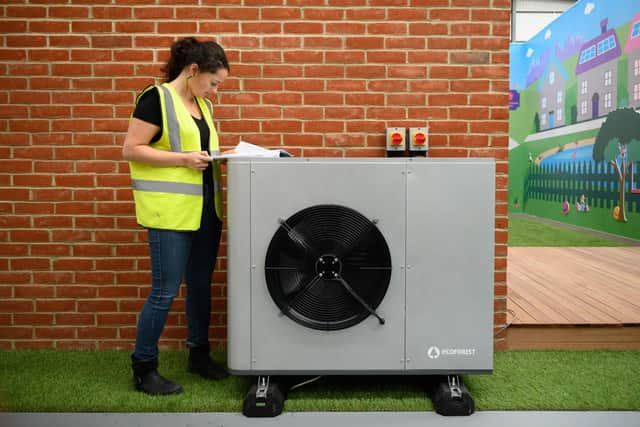Scotland's just transition to net zero carbon emissions must bring good, well-paid jobs – Jim Skea, Patricia Findlay and Mary Alexander
Today Scotland’s Just Transition Commission will write to Mairi McAllan, our new Cabinet Secretary for Net Zero, and the Cabinet Secretary for Well-being Economy, Fair Work and Energy, Neil Gray. The commission is an independent expert advisory body that aims to ensure justice is at the heart of the big changes that will help Scotland achieve net zero. Our message today is clear: there is a huge opportunity to be grasped if we can get the just transition right. The key here is to make sure the Scottish Government uses every lever at its disposal to put fair work right at the heart of the process.
Many of the new jobs required will be in construction and civil engineering, both for new infrastructure as we deliver renewable energy at ever-greater scale, and in making our homes and settlements energy efficient. There is a risk local communities may not enjoy the full benefit of this unless a stable and settled workforce can be created within the areas where this work needs to happen.
Advertisement
Hide AdAdvertisement
Hide AdWe can’t achieve a just transition if the jobs created in our new economy are poor quality, low paid or insecure. As the Scottish Government revises its energy strategy, it must ensure that jobs created and sustained via the transition align with fair work principles. That means workers should be well paid, have an effective voice, and, among other things, access to good conditions.
Business and industry are concerned about potential bottlenecks in finding workers with the right skills in Scotland with demand for them set to sky-rocket over the coming years. This could slow down the transition and limit its social and economic benefits. Workforce planning and fair work conditionality – meaning that every pound spent should deliver fair work principles – are two critical aspects of a strategic win-win. The Scottish Government must help support the creation of a workforce and a key element of this is ensuring jobs offer prospective workers and their communities a secure future.
Our built environment and approach to construction is an area of significant concern for Scotland’s just transition. The gap between aspiration and what is being done, as well as our existing investment model, presents a major challenge, with harmful effects on people’s everyday lives in terms of fuel poverty, health, well-being and social inequity. This is despite the existence of proven technologies in this area to address the problem. We are at risk of another “lost decade” with major justice implications.
The Fair Work Convention’s Construction Inquiry found clear practical challenges to the transition to net zero, with little demand in the current market for low-carbon building techniques. Ultimately too many people currently working in construction do not have the skills they need for retrofitting activities like installing heat pumps. Thousands more workers are needed to support retrofitting and to replace workers who are about to retire. This is a real challenge for an industry that relies heavily on word-of-mouth recruitment. It is also a challenge in terms of modernising methods of construction.
Yet this also represents an opportunity to do things differently. The convention’s inquiry called for a significant advertising campaign, with a focus on promoting construction to a more diverse range of people. The Just Transition Commission today calls for a clear plan to raise the profile and attractiveness of construction as key growth sector and a strategy to ensure the diversity and inclusiveness of the new workforce. None of this can happen without effective leadership, partnership working and collaboration across industry stakeholders to identify a pipeline of vacancies and effective routes into the industry.


Ensuring a high-quality supply of skills, modernising methods of construction, enhancing diversity and tapping the potential of workforces to drive more environmentally sustainable ways of working are all inextricably linked. These important outcomes won’t be delivered without strategic consideration of the industry’s current and future workforce and the role of fair work in supporting not just the workforce but also the future of the industry.
The Scottish Government should develop a just transition strategy for procurement, including within the construction sector, to drive change as a major client. This should incorporate the Fair Work Convention's recommendations on procurement from their inquiry into construction. We recognise the Scottish Government can’t do everything on its own and will need to collaborate and cooperate with the UK Government as well as other devolved administrations. This makes it especially important that it maximises the use of those powers and levers over which it can exercise full control to drive meaningful change.
We also need to put these issues in an international context. In developing a strategy for delivering fair work via Scotland’s energy transition, there is a risk of making Scotland a fair work nation by offshoring bad jobs. Just as we mustn’t offshore carbon, we must ensure we don’t offshore harmful employment practices. The procurement processes and the supply chain for our energy infrastructure must reflect this.
Advertisement
Hide AdAdvertisement
Hide AdScotland has established an international reputation as a leader on just transition. Let’s make sure we truly deliver on this, especially now that many are struggling with the cost-of-living crisis. Just transition isn’t just about what we’re doing 20 to 30 years from now. With the right package of policy actions, with fair work at their core, it can make people’s lives tangibly better here and now and create communities that thrive.
Jim Skea is chair of the Just Transition Commission; Patricia Findlay and Mary Alexander are co-chairs of the Fair Work Convention
Comments
Want to join the conversation? Please or to comment on this article.